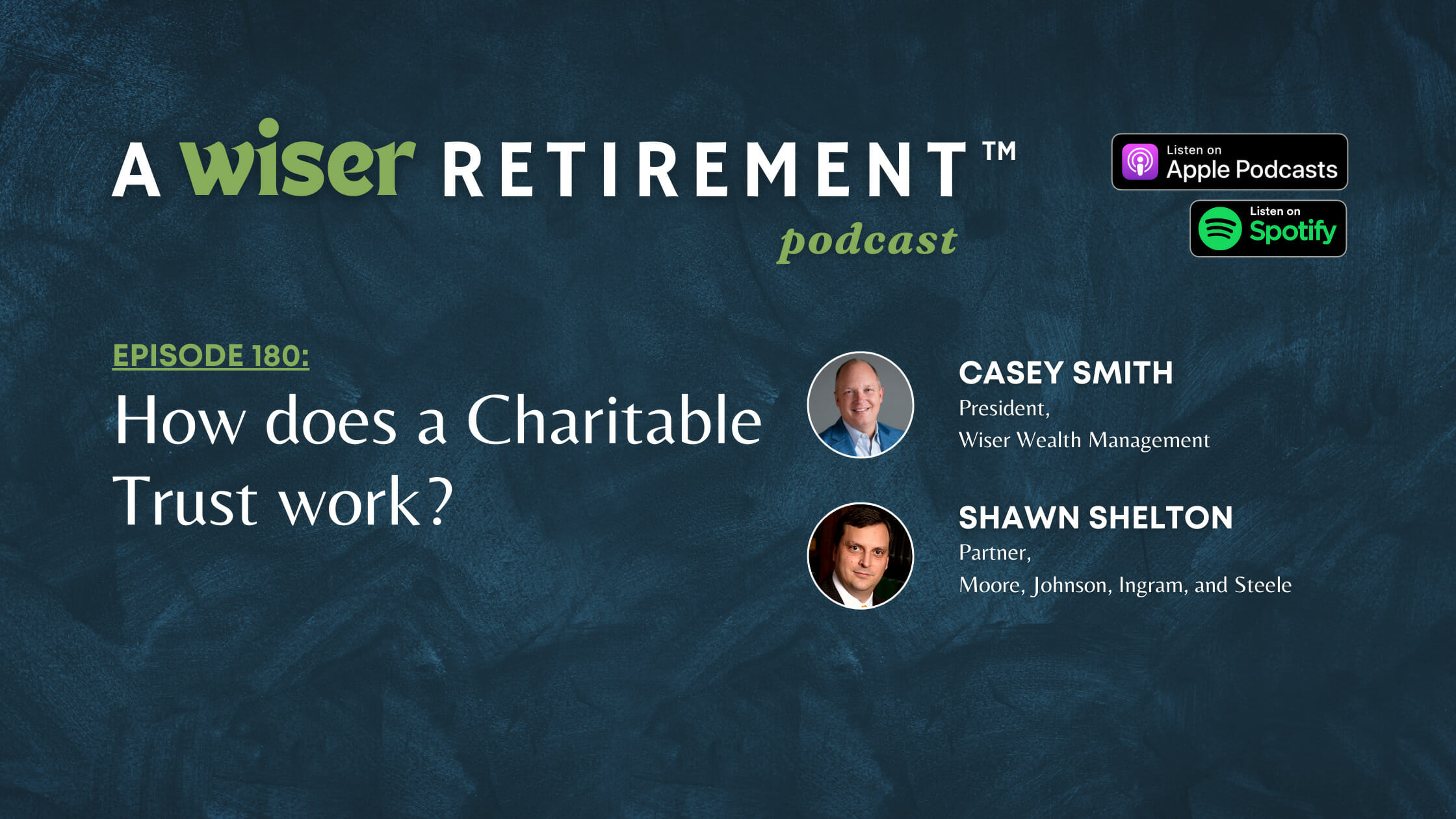
How does a Charitable Trust work?
Estate planning can feel like navigating a labyrinth of complex legalities and tax codes. On this episode of A Wiser Retirement™ Podcast, Casey Smith is joined by guest Shawn Shelton, partner at Moore Ingram Johnson & Steel to explain Charitable Remainder Trusts (CRTs), as a strategic tool for those with estates valued over the $25 million federal estate tax exclusion.
Listen on Apple Podcasts or watch on YouTube:
SUMMARY:
The amount of money one can give during their lifetime or at the time of passing has increased in 2023 to $12.9M. So, a couple with assets of $25M or under can gift their money tax-free. However, any couple with assets above $25.8M are over the exclusion limit, and therefore have taxes due on their estate. Unfortunately for many, this exemption is going away in 2026. We estimate that the change will decrease that number to somewhere between $6.5M to $7.5M, which would be around $14 to $15 million per couple. This increases the number of Americans who could be looking at potential estate tax liability.
Understanding the Charitable Remainder Trust
Assuming a family has assets that have highly appreciated. Examples of this could Apple stocks bought as an IPO in the 80s, or they have a business that has succeeded and appreciated in value, or even real estate. This family is charitable in nature and wants to help others since they have plenty of resources for themselves. They come to Wiser, and raise the concern that their assets stand above the exclusion limit, so they need estate planning done.
One of the options is the charitable remainder trust. In this trust, some of the low-basis assets are taken and then transferred to an irrevocable trust. The remainder trust is in the Internal Revenue Code, containing documents by the IRS. In a split-interest trust, you have a lead beneficiary who receives an income stream either for a period of years (up to 20 years) or for the life of an individual. The remainder beneficiary receives it when that period ends, or when that person passes away.
Therefore, in a charitable remainder trust, the remainder beneficiary can be a charity, and the lead beneficiary is usually the grantor or the person who set up the trust. They can take some of the low-basis highly appreciated assets and transfer them to the trust since the trust itself is tax-exempt. The trust can then have a diversified portfolio, and sell the assets without having to immediately pay income tax on it.
In this case, income tax doesn’t go away because there’s also a stream of income that is paid out to the grantor, which can be done as an annuity trust or a unit trust. An annuity trust pays a fixed dollar amount from the trust every year. The unit trust pays a fixed percentage of the value of the trust assets, and the trust’s assets need to be revalued every year. This may increase or decrease payment depending on the investment performance of the trust itself. Consequently, when that portfolio is liquidated and the trust diversified, the trust itself doesn’t pay income tax. Nonetheless, the distributions that are going out to the grantor or the lead beneficiary are includable in their income. Then the nature of that income depends on the nature of the income for the trust.
Double-Check with Trusted Professionals if This is Right for You
Many people have concerns about creating a charitable remainder trust and ending up not leaving enough money to their own families. If they are in good enough health, a life insurance policy can always help solve that problem. So, an option would be to open the remainder charitable trust after you have qualified for a life insurance policy. It is also crucial that you consult with your financial advisor and CPA. They can help you understand what the implications of opening a charitable trust will be to you immediately, and to your family in the future.
A Donor-Advised Fund is a Simpler Way to Donate Money
If a charitable remainder trust, is not for you, keep in mind that there are other ways to donate money. For example, a donor-advised fund. These funds are a much simpler way of donating money, because you don’t need to have a lot to do it. As opposed to the remainder charitable trust, which requires you to be above the exemption limit. Donor-advised funds exist for every-day families who want to teach their children or grandchildren the principle of charity.
Download our eBook on “Buyer Beware: Why do they keep trying to sell you that annuity?”
TIMESTAMPS:
0:00 Intro
03:30 Understanding the Charitable Remainder Trust
20:45 Double-Check with Trusted Professionals if This is Right for You
22:15 A Donor-Advised Fund is a Simpler Way to Donate Money
LINKS:
Learn more about Casey Smith or Shawn Shelton.
CONNECT:
Twitter, Instagram, Facebook, LinkedIn, and YouTube.
Learn more about A Wiser Retirement™ podcast and access previous episodes.
Share This Story, Choose Your Platform!
Wiser Wealth Management, Inc (“Wiser Wealth”) is a registered investment adviser with the U.S. Securities and Exchange Commission (SEC). As a registered investment adviser, Wiser Wealth and its employees are subject to various rules, filings, and requirements. You can visit the SEC’s website here to obtain further information on our firm or investment adviser’s registration.
Wiser Wealth’s website provides general information regarding our business along with access to additional investment related information, various financial calculators, and external / third party links. Material presented on this website is believed to be from reliable sources and is meant for informational purposes only. Wiser Wealth does not endorse or accept responsibility for the content of any third-party website and is not affiliated with any third-party website or social media page. Wiser Wealth does not expressly or implicitly adopt or endorse any of the expressions, opinions or content posted by third party websites or on social media pages. While Wiser Wealth uses reasonable efforts to obtain information from sources it believes to be reliable, we make no representation that the information or opinions contained in our publications are accurate, reliable, or complete.
To the extent that you utilize any financial calculators or links in our website, you acknowledge and understand that the information provided to you should not be construed as personal investment advice from Wiser Wealth or any of its investment professionals. Advice provided by Wiser Wealth is given only within the context of our contractual agreement with the client. Wiser Wealth does not offer legal, accounting or tax advice. Consult your own attorney, accountant, and other professionals for these services.





